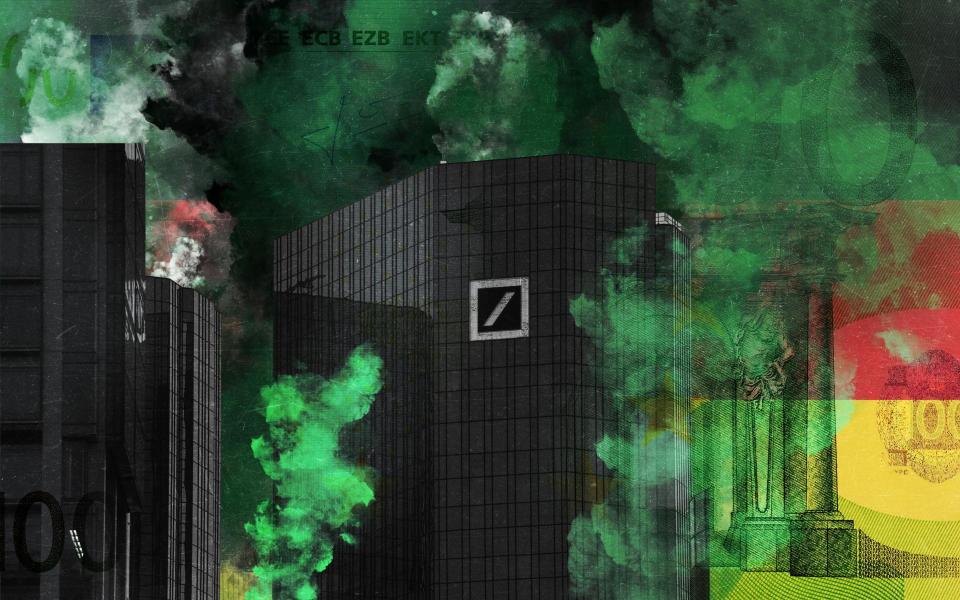How Deutsche Bank's inflated green investments threaten fresh setback after decade of failures

Christian Sewing swiftly moved on as he downplayed allegations of "greenwashing" as just "noises".
In a call with analysts last September, the chief executive of Deutsche Bank pushed aside reports that US and German regulators had launched an investigation into DWS, the lender's asset manager unit.
Sewing stressed the need for financial institutions to be “very careful and very disciplined and very diligent in your [ESG] processes, in your reporting, in your measurement and also in deciding is it ESG conform or is it not?”
Despite his conviction, allegations that DWS had inflated its environmental, social and governance (ESG) credentials – the sustainability of investments – have once again come to the fore.
On Wednesday, Asoka Woehrmann, DWS’s chief executive, resigned after five years at the helm. It came less than 24 hours after German authorities raided the asset manager’s Frankfurt headquarters.
He told employees that the ongoing investigations by German regulator BaFin and the US Securities and Exchange Commission (SEC) into “prospectus fraud” had made his position untenable.
“The allegations made against DWS and myself in past months have become a burden for the company, as well as for my family and me”, Woehrmann added.
“In order to protect the institution and those closest to me, I would like to clear the way for a fresh start.” He will be replaced by Stefan Hoops, head of the corporate banking division.
A fresh scandal at Germany’s biggest lender threatens to drag Deutsche Bank back into the spotlight just weeks after bosses vowed to move on from a decade of failures including fines for improper mortgage lending and money laundering, as well as declining revenues and rounds of layoffs.
It raises further questions, meanwhile, over the culture within Germany’s corporate world, following a series of accounting scandals at now-insolvent payment processor Wirecard and the Volkswagen emissions scandal in 2015 – known as Dieselgate.
The incident also highlights how lenders risk facing legal consequences for “greenwashing” – giving false information to promote an environmentally responsible image – as companies grapple to upgrade their sustainability credentials in the move towards net zero.

Steven Barrett, a barrister at Radcliffe Chambers says: “[DWS’s] greenwashing raid is significant. It needs to be seen in the context of the huge growth in climate litigation across the world.
“People are passionate about this and passion fuels litigation.”
He adds that this week’s incident could set the precedent for “legal cases here [in the UK] very soon” in relation to greenwashing as regulators crack down.
Around 50 police officers entered the buildings of Deutsche Bank and DWS on Tuesday morning to question unnamed individuals in connection with suspected greenwashing activities.
In an email to executives in March 2021, Fixler said DWS misled investors by claiming that hundreds of billions of its assets under management were “ESG-integrated”. The asset manager has since dropped the label and scaled back its sustainability claims.
In its 2021 annual report, DWS disclosed only €115bn (£98bn) in “ESG assets” for the year, some 75pc less than the €459bn reported the year before.
German authorities began investigating in January, following reports on Fixler’s claims, according to Bloomberg, and found ESG factors only played a role in a minority of investments – contrary to the sales prospectuses of DWS funds.
In March this year, the US Department of Justice (DoJ) censured Deutsche Bank for failing to disclose Fixler’s complaint, which was in violation of a deferred prosecution agreement. As part of that deal, which was signed in 2021, the lender had promised to report all new legal issues to US authorities as soon as it was made aware of them.
A spokesman for DWS said it has “continuously cooperated fully with all relevant regulators and authorities on this matter and will continue to do so”, adding that the company stands behind its most recent annual report.
DWS shareholders clearly not impressed with Deutsche Bank's handling of the greenwashing issue and Wöhrmann succession: DWS shares down 7 pct today, after a 5 pct drop yesterday. pic.twitter.com/bzXoenIJMc
— Olaf Storbeck (@OlafStorbeck) June 1, 2022
Behind the scenes, however, it appears there may have been a conflict of interest in how Fixler’s claims were investigated.
While PwC was brought in to examine Fixler’s accusations, the accountancy firm did not contact her and concluded its report based solely on data collected from DWS, reported the Financial Times. In a separate matter, the “Big Four” firm received €300,000 for consulting DWS on its net-zero strategy while setting up its probe.
Controversially, outgoing chief executive Woehrmann fired Fixler in March 2021 on the basis that her division had not made sufficient progress toward the asset manager’s green investment goals. Fixler subsequently sued for unfair dismissal, but lost the case in January.
Yet this is not the first time Woehrmann, whose resignation takes effect on June 9, has found himself in the public eye.
In early 2021, he was mired in scandal for extensive use of a personal email account to conduct company business and for wiring €160,000 (£136,000) to a Deutsche Bank client four years earlier. Both parties later said the transaction was part of an unsuccessful attempt to purchase a Porsche.
For Germany’s biggest lender, the botching of its ethical reset could spark a crisis as just one in a long list of scandals.
In September 2016, the US Department of Justice levied a fine of $14bn against the lender for the poor underwriting of residential mortgages, of which around $7.2bn was later paid in a settlement. A year later, it made a $630m payout to US and UK authorities to settle a money laundering case in Russia.
Meanwhile, Deutsche Bank has struggled to regain its footing since the financial crisis which it went into ranking as the world’s largest bank by assets.
Revenues are currently down by quarter from all-time highs, while it has slashed a fifth of its workforce – 18,000 jobs – and closed its global equities business.
Sewing, meanwhile, has struggled to deliver on plans to merge Deutsche Bank with another European lender to fulfil German ambitions of having a European banking champion to rival its more successful American counterparts. In 2019, he pulled the plug on a potential merger with Commerzbank, Germany’s second-largest lender.
As Deutsche Bank deals with the latest crisis, incoming DWS chief Hoops is sure to have a large pile in his in-tray.

 Yahoo Finance
Yahoo Finance